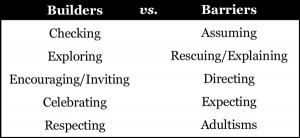Developing Capable People is a program designed by Stephen Glenn and Jane Nelson. Stephen Glenn was a brilliant and inventive man who was in recovery from alcohol; he learned much from the Twelve Step Program and focused it on people-making. He aimed to help parents become conscious of what they were seeking to nurture in their children. Too often parents, both consciously and unconsciously, shape their children to be conformable with the cultural and the family values. This approach requires more and more control over the children in order to instill conformity in them. It is desirable that children grow up to take responsibility for themselves and their choices rather than conforming or rebelling against established norms.
Stephen Glenn identified what he called “the significant seven,” the core of which consisted of three attitudes and four skill sets that effective parents need to develop capable children. The attitudes that parents need to help their children develop are: 1) the attitude that I am significant, 2) the attitude that I am capable and 3) the attitude that I have influence in my life.
The four skill sets are what Glenn calls intra-psychic skills: skills in dealing with self-control and self-awareness; skills in relating to others, e.g., empathy and communication; systemic skills which enables them to deal with the family system, the neighborhood system, the school system and the government. The final skill set puts together all the behavioral skills, the skills required to make good judgments to become capable and well adapted people.
The other base of Glenn’s training concerns Builders and Barriers in relationships. These Builders and Barriers are actions and words that create respect and enhance capabilities for human interaction or barriers that block this achievement. Here is how these contrasting actions line up:
Glenn designed this program to be conducted two hours a week for ten weeks. In weekly class sessions the concepts are presented; following class, parents are divided into groups to practice the exercises to help internalize the ideas. The presentation of material and the group experience enable the parents to gain skills and deeper insights into how the system works.
Through the years I found myself using this rich perspective in individual and family therapy. Often parents need to understand more clearly what to emphasize in order to empower their children. As they continue in the program, they begin to say that they are on a journey to developing capable people. In the training the parents are changed so that they can, perhaps, rear their children to become capable adults. Couples often report that the training in developing capable people has changed their relationship not only with their children but also with each other and has increased their effectiveness in their vocation.
These insights have certainly helped me deal with my issues. In times of struggle and anxiety with my son I have seen how my anxiety makes me want to control the situation. My anxiety pushes me to make demands on him. Subscribing to this perspective has enabled me to treat him with respect, to interact with him through checking out what I think he is saying and exploring with him, rather than directing him. This approach has a better outcome than efforts to direct or control because once a child is out of diapers, we parents are never in complete control again, if we ever were. I have to keep my respect for him even when his choices are painful to both of us. Living by the insights of this program helps people who are seeking to have integrity in their relationships.
